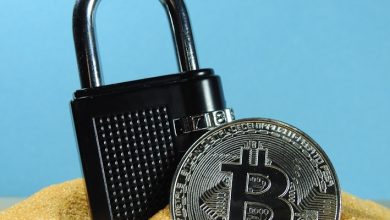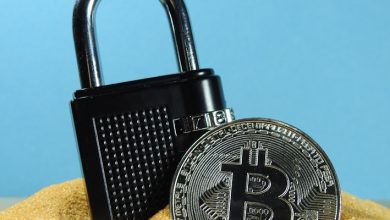How to Protect Your Private Keys from Cyber Threats

- Understanding the importance of private keys in cybersecurity
- Common cyber threats targeting private keys and how to avoid them
- Best practices for securely storing and managing your private keys
- The role of encryption in protecting private keys from hackers
- Key differences between hot and cold storage for private keys
- How to create strong and unique passwords for your private keys
Understanding the importance of private keys in cybersecurity
Private keys are a crucial component of cybersecurity that play a significant role in protecting sensitive information and data. They are used to encrypt and decrypt information, authenticate users, and ensure the integrity of digital communications. Understanding the importance of private keys in cybersecurity is essential for individuals and organizations to safeguard their confidential information from cyber threats.
Common cyber threats targeting private keys and how to avoid them
Private keys are a critical component in securing sensitive data and transactions in the digital world. However, they are also prime targets for cyber threats that can compromise their security and lead to unauthorized access. It is essential to understand the common cyber threats that target private keys and take necessary precautions to avoid falling victim to them.
- Phishing Attacks: Cybercriminals often use phishing emails or fake websites to trick individuals into revealing their private keys or other sensitive information. To avoid falling for phishing scams, always verify the authenticity of the sender before clicking on any links or providing any information.
- Malware: Malicious software can infect your device and steal private keys stored on it. To protect your private keys from malware attacks, make sure to regularly update your antivirus software and avoid downloading files or programs from untrusted sources.
- Brute Force Attacks: Hackers may attempt to crack the encryption of private keys through brute force attacks, where they systematically try different combinations until they find the correct one. To prevent brute force attacks, use strong and unique passwords for your private keys and consider using multi-factor authentication.
- Man-in-the-Middle Attacks: In a man-in-the-middle attack, a hacker intercepts communication between two parties and can manipulate the data exchanged, including private keys. To protect against man-in-the-middle attacks, use secure communication channels such as encrypted messaging apps or VPNs.
- Insider Threats: Employees or individuals with authorized access to private keys may pose a threat by intentionally or unintentionally leaking sensitive information. To mitigate insider threats, limit access to private keys to only those who absolutely need it and regularly monitor and audit their activities.
Best practices for securely storing and managing your private keys
When it comes to safeguarding your private keys from cyber threats, there are several best practices you should follow to ensure they are securely stored and managed. Here are some tips to help you protect your sensitive information:
- Use a reputable password manager to store your private keys securely. This will help prevent unauthorized access to your keys and keep them safe from cyber attacks.
- Enable two-factor authentication (2FA) wherever possible to add an extra layer of security to your accounts. This will help prevent unauthorized access even if your private keys are compromised.
- Avoid storing your private keys on devices that are connected to the internet. Instead, consider using a hardware wallet or storing your keys offline in a secure location.
- Regularly back up your private keys and store them in multiple secure locations. This will help ensure that you can still access your keys even if one backup is lost or compromised.
- Keep your software and devices up to date with the latest security patches to protect against known vulnerabilities that could be exploited by cyber criminals.
By following these best practices for securely storing and managing your private keys, you can minimize the risk of falling victim to cyber threats and keep your sensitive information safe from harm.
The role of encryption in protecting private keys from hackers
Encryption plays a crucial role in safeguarding private keys from cyber threats. By encrypting private keys, individuals can ensure that even if hackers gain access to their systems, they will not be able to decipher the keys. This adds an extra layer of security to sensitive information and helps prevent unauthorized access.
Key differences between hot and cold storage for private keys
When it comes to safeguarding your private keys from cyber threats, understanding the key differences between hot and cold storage is crucial. Hot storage involves storing your private keys on devices that are connected to the internet, such as computers or smartphones. On the other hand, cold storage refers to storing private keys on devices that are not connected to the internet, like USB drives or paper wallets.
One of the main differences between hot and cold storage is the level of security they offer. Hot storage is more convenient as it allows for easy access to your private keys whenever needed. However, it is also more vulnerable to cyber attacks since the keys are constantly connected to the internet. Cold storage, on the other hand, provides a higher level of security since the keys are kept offline, making it less susceptible to hacking attempts.
Another key difference between hot and cold storage is the risk of physical damage. Devices used for hot storage, such as computers and smartphones, are more prone to physical damage like hardware failures or theft. Cold storage devices like USB drives or paper wallets, while not immune to physical damage, are less likely to be affected since they are not constantly in use.
Overall, the choice between hot and cold storage for private keys depends on your individual needs and risk tolerance. Hot storage is more suitable for frequent transactions and quick access to your keys, but it comes with higher security risks. Cold storage, on the other hand, offers greater security but sacrifices some convenience. By understanding these key differences, you can make an informed decision on how to best protect your private keys from cyber threats.
How to create strong and unique passwords for your private keys
When it comes to protecting your private keys from cyber threats, one of the most important steps you can take is creating strong and unique passwords. Here are some tips to help you do just that:
- Include a combination of uppercase and lowercase letters, numbers, and special characters in your password.
- Avoid using easily guessable information, such as your name, birthdate, or common words.
- Make your password at least 12 characters long to increase its complexity and security.
- Consider using a passphrase instead of a single word, as longer passwords are generally more secure.
- Use a different password for each of your private keys to minimize the risk of multiple accounts being compromised.
By following these guidelines and creating strong, unique passwords for your private keys, you can significantly reduce the risk of falling victim to cyber threats and ensure that your sensitive information remains secure.



